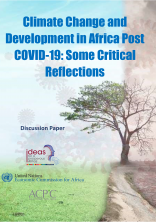Discussion paper: climate change and development in Africa post COVID-19: Some critical reflections

The World is currently in the throes of unprecedented health and economic crisis brought on by the global spread of the novel corona virus-induced COVID-19. COVID-19 has already infected millions of people worldwide, with tens of thousands of fatalities. The globalized and interconnected nature of our society and economy have quickly morphed a public health event into a global political, economic, psychological and social crisis of epic proportions. Public health systems across the board have been strained beyond existing capacities, revealing the vulnerabilities of the world’s populations to a pandemic. The COVID-19 pandemic has also wrought havoc on economies as a result of the shutting down of almost all economic activities as part of the effort to contain the spread of the virus. The long term effects and impacts of the pandemic are still being assessed and will be felt for many years after the pandemic itself. It is already forecast that there will be no growth in 2020 and 2021, and global GDP will recover to pre-COVID-9 levels only in 2022.[1]
In addition to global economies going into a recession, the world is facing two emergencies simultaneously – the Climate emergency and COVID-19. Suggestions that we cannot afford to address climate change, biodiversity loss and economic crises at the same time represent a false choice[1], all crises must be addressed at the same time. The climate emergency has been unfolding over many decades, and the first global response to it is enshrined in the United Nations Framework Convention for Climate Change concluded in Rio de Janeiro in 1992. The COVID–19 emergency, on the other hand, emerged only recently in December 2019, and was declared a global emergency in mid-January 2020. In a matter of weeks, Covid-19 has changed the world as we knew it. It has brought commerce to an almost complete standstill, locked down whole nations and quarantined whole populations indoors in accordance with the Siracusa Principles[2] . The response to COVID–19 has been an unprecedented mobilization of society, business and state resources.
[1] E.g. members of the European Conservatives and Reformists group in the European Parliament have argued for the rolling back of environmental commitments by the European Union. https://ecrgroup.eu/article/ecr_group_we_need_to_put_pragmatism_first
[2] Diego S. Silva, Maxwell J. Smith. Health and Human Rights 17/1 Commentary: Limiting Rights and Freedoms in the Context of Ebola and Other Public Health Emergencies: How the Principle of Reciprocity Can Enrich the Application of the Siracusa Principles
[1] Economist Intelligence Unit. Sovereign debt crises are coming. https://pages.eiu.com/rs/753-RIQ-438/images/sovereign-debt-crisis.pdf?mkt